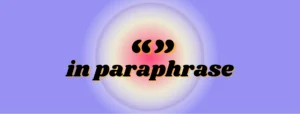Citing your sources gives your work legitimacy and shows that you are aware of the sources you use. This tutorial will walk you through the nuances of referencing paraphrases and cover popular citation formats including Chicago, MLA, and APA, so scroll to get to your preferred style of citation.

✅ AI Essay Writer ✅ AI Detector ✅ Plagchecker ✅ Paraphraser
✅ Summarizer ✅ Citation Generator
In gemeral, paraphrasing is a process, where you engage with the thoughts and concepts of others, digest them, and then present them in a manner uniquely your own. It requires a deep understanding (not just a quick look through) of the subject matter and the ability to articulate it in your own voice and writing style.
Preserving the original meaning is always a key principle here. The point of effective paraphrasing lies in the ability to capture the original idea, so that the reader, even without referring to the source, gets the intended message. While the goal is to avoid plain copying, the stress lies more on understanding the core concept and rearticulating it in your work.
When to Cite a Paraphrase
Citing a paraphrase is necessary whenever you rephrase someone else’s ideas or information in your own words. It’s a key aspect of writing to avoid plagiarism. Here are specific instances when you should cite a paraphrase:
| Unique Ideas or Information | Whenever you paraphrase content that includes unique ideas, theories, findings, or data that are not considered common knowledge, you need to cite the source. This shows respect for the original author’s intellectual property. |
| Specific, Uncommon Facts | If the paraphrased content contains specific facts or figures that are not widely known or easily verifiable, you must provide a citation. |
| Interpretations or Judgements | When you rephrase someone’s analytical perspectives, interpretations, or judgments, it’s essential to acknowledge the original source, as these are specific to the author’s unique viewpoint. |
| Direct Influence on Your Work | If the paraphrased material has directly influenced your work or argument, acknowledging the source is necessary to provide context and credibility to your own work. |
How to Cite a Paraphrase in Different Styles
APA, MLA, and Chicago/Turabian are three predominant citation styles used in academic writing, each with its unique conventions and purposes.
APA Style 7th edition
The American Psychological Association (APA) style is commonly used in the social sciences. It emphasizes the author’s last name and the year of publication for in-text citations and is known for its clear and concise format, particularly beneficial for scientific writing. APA style also places a strong emphasis on the date of a work, reflecting the importance of recent information in fields like psychology and sociology.
In-text citation: Include the author’s last name and the year of publication. If directly quoting, include the page number or paragraph number for web content:
(Lowen, 2022)
Paraphrase Example:
Lowen (2022) argues that effective communication skills are essential in the workplace.
MLA Style 8th Edition
The Modern Language Association (MLA) style is widely used in the humanities, especially in English literature, cultural studies, and other related fields. Unlike APA, MLA focuses more on the page number for in-text citations to easily locate the referenced part in the original work. This style is characterized by its straightforward approach to citation, which makes it particularly user-friendly for writers and readers alike.
In-text citation: Include the author’s last name and the page number. If there is no page number, just the author’s name will be enough.
(Lowen 45)
Paraphrase Example:
Effective communication skills play a crucial role in workplace dynamics (Lowen 45).
Chicago/Turabian Style 17th Edition
The Chicago/Turabian style offers two systems: an author-date system similar to APA and a notes and bibliography system. The latter is particularly common in history and some other humanities fields, offering flexibility for writers to use footnotes or endnotes. This style is notable for its comprehensive approach and is often used in more extensive research works where detailed citation is necessary.
In-text citation (Author-Date): Similar to APA, include the author’s last name and year of publication.
(Lowen 2022)
Note and Bibliography: In notes, include author’s full name, source title, and page number. In the bibliography, include full details.
1. Jeremy Lowen, “Effective Communication Techniques,” 45.
Paraphrase Example (Note):
Jeremy Lowen notes that effective communication is vital in professional settings.^1
^1 Jeremy Lowen, “Effective Communication Techniques,” 45.
In each case, make sure that you are rephrasing the original text in your own words and keeping the original meaning. The citation provides credit to the original author for their ideas.
FAQ
Follow us on Reddit for more insights and updates.





Comments (0)
Welcome to A*Help comments!
We’re all about debate and discussion at A*Help.
We value the diverse opinions of users, so you may find points of view that you don’t agree with. And that’s cool. However, there are certain things we’re not OK with: attempts to manipulate our data in any way, for example, or the posting of discriminative, offensive, hateful, or disparaging material.